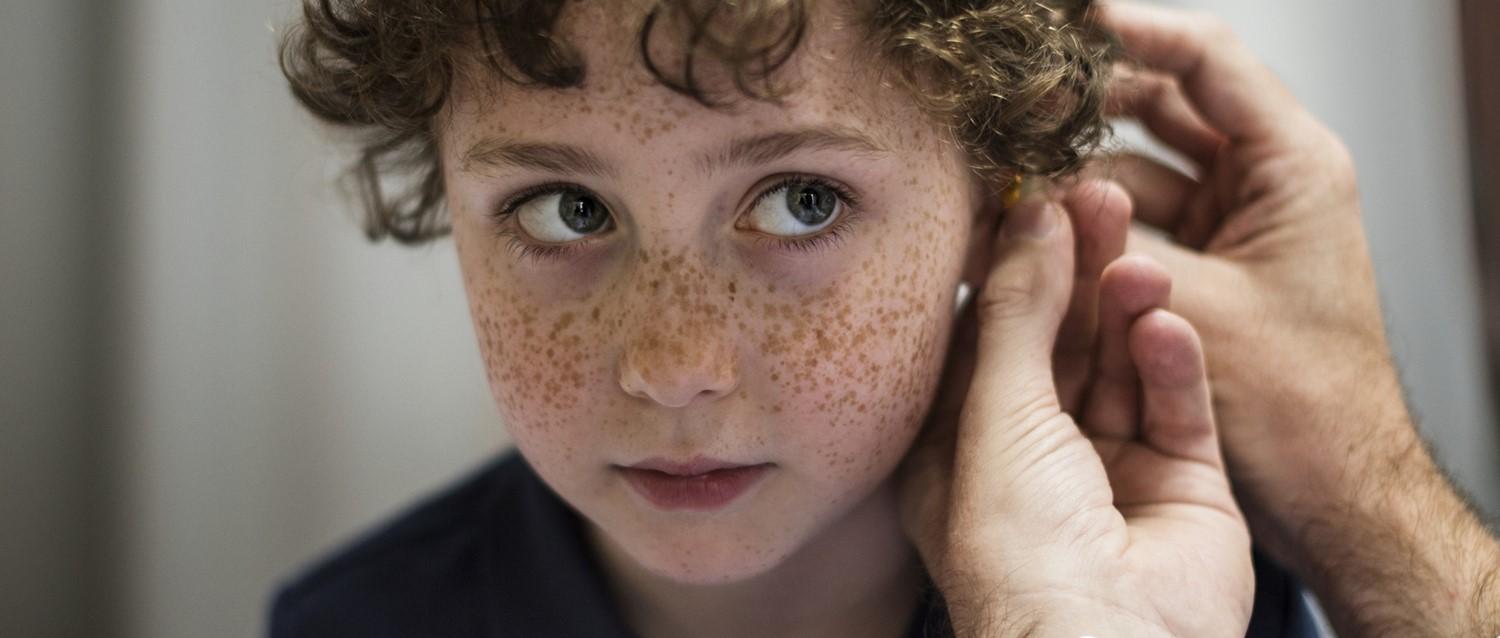
Signs of tinnitus to look out for in children
Peer reviewed by Dr Sarah Jarvis MBE, FRCGPLast updated by Natalie HealeyLast updated 6 Feb 2018
- DescargarDescargar
- Compartir
Think of tinnitus and it's likely you'll associate the hearing condition with the older generation - perhaps those who have attended a few too many rock concerts. But think again. Tinnitus affects young people too, with one child in every classroom across the UK estimated to have it.
En este artículo:
Seguir leyendo
¿Qué es el tinnitus?
Tinnitus is a ringing, humming, pulsing or hissing sound in your ear. The sounds, which vary from person to person, are created by your own hearing system. It's the feeling of hearing noises when no sound is actually present.
The condition is not just for adults. But often kids think that hearing these sounds is normal, so might not tell their parents. Tinnitus may seem to get worse when they're anxious and could lead to difficulty sleeping.
But many parents are unaware that children can suffer from tinnitus in the first place. In fact, research published in 2018 from the British Tinnitus Association (BTA) showed worrying statistics around parents' knowledge of the condition. Just under a third (32%) of UK parents are aware that children under the age of 10 can have tinnitus, and just 37% think it can affect children aged 10 to 16 years old.
Patient picks for Other signs and symptoms

Signos y síntomas
Causes of nausea
Feeling sick - nausea - or being sick is a miserable experience. We tend to think of feeling sick as being a gut problem, but there are lots of other reasons. You have a 'vomiting centre' in your brain and it's often here that the issue lies. In addition, your inner ears play an important role in balance, and an issue affecting the inner ear can often lead to vomiting or feeling sick in addition to dizziness. The other symptoms that go along with feeling or being sick often give clues to the cause.
por la Dra. Sarah Jarvis MBE, FRCGP

Signos y síntomas
Fainting
Fainting is a temporary loss of consciousness that happens when the brain does not receive enough oxygen because of reduced blood flow to the brain. It comes on suddenly, only lasts for a short time and you recover fully within a short time. It is also often called a blackout. The medical term is syncope. It isn't the same thing as a seizure which usually causes jerking. It is important to seek medical attention if you experience faints. Faints may be caused by a serious problem. However, this is unusual. The most common causes are mentioned below.
por el Dr. Colin Tidy, MRCGP
Signs of tinnitus in children
Children with tinnitus are often unable to vocalise what it is the're hearing or experiencing, and so often display other more subtle signs of the condition.
"While unsurprisingly, most parents would associate their child reporting sounds in their ears or head with tinnitus - the problem is that children are often unable to explain what it is they're experiencing so unless they are directly asked the question by a parent, teacher or medical professional, it can often be overlooked," says David Stockdale, chief executive of the BTA.
"They may be struggling alone and so may often display more subtle signs, such as appearing distracted or becoming anxious which can also have a real impact on their general quality of life, including their behaviour and learning at school."
Seguir leyendo
What causes tinnitus in children?
As with adults, there are many reasons why children may experience tinnitus.
Veronica Kennedy, consultant audiovestibular physician at Bolton NHS Foundation Trust, and former chair of the BTA's Professional Advisers’ Committee, explains: "For most children there is no significant underlying condition (pathology). Some children can be aware of tinnitus where their ears are blocked due to wax or glue ear. Some may have a hearing loss for other reasons."
A temporary hearing loss associated with tinnitus might occur after noise exposure. For instance, the child may have attended a loud concert. But with repeated exposure, this hearing problem can become permanent.
"A very small number of children have tinnitus in association with a medical condition so all children with troublesome tinnitus should be referred to their local paediatric audiology service or ENT clinic," Kennedy stresses.
What parents should do
If you're concerned that your child may have tinnitus, it's best to visit your GP. Kennedy reveals that in most cases of tinnitus in children, the outcome is positive. But it can also be a source of worry for a child if it's not addressed.
"For most children and teens with tinnitus, an explanation of the condition and reassurance is all that is needed. Some benefit from strategies to help cope with the tinnitus and some need strategies to cope with stress and feelings of anxiety. A small number of children need psychological support."
In one study of tinnitus and anxiety/depression in children, 32% had significant anxiety and 14.5% depression. Those with depression experienced tinnitus for 24 months compared to those without depression (17 months).
"But another feature that indicates a good prognosis is that few adults troubled with tinnitus recall having it as children," Kennedy concludes.
You can contact the BTA for advice and to access resources for children with tinnitus.
Historia del artículo
La información de esta página ha sido revisada por médicos cualificados.
6 Feb 2018 | Latest version

Pregunte, comparta, conecte.
Explore debates, formule preguntas y comparta experiencias sobre cientos de temas de salud.

¿Se encuentra mal?
Evalúe sus síntomas en línea de forma gratuita